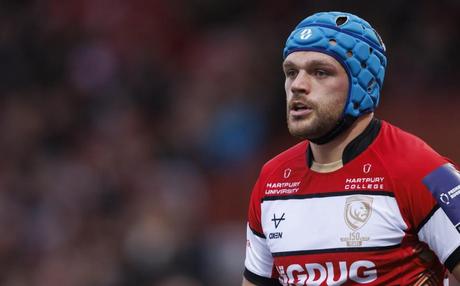
Zach Mercer has experienced many highs and lows. From leaving his boyhood club Bath in 2021 to join Montpellier, winning the Top 14 in his first year in France and the Player of the Year award the following season, then returning home to fight for a place in the Rugby World Cup, but did not make the England squad.
Gloucester's back row remains out of the Test picture, but as part of a special report from Telegraph Sport on the mental challenges of playing rugby union, the 26-year-old has spoken out about the psychological problems he has endured , along with many other professional players, to emphasize the importance of getting help and outline the specific difficulties of his sport.
With the news last November that Owen Farrell had made the decision to step back from international rugby for the mental well-being of him and his family - the question must be asked: what makes rugby so psychologically demanding?
'I look back now, if I could keep my first caps, I would'
On the one hand, Mercer knows he is extremely fortunate to be able to play the sport he loves and is proud of the two injury-free seasons he has spent in France, but there have been problems along the way. Namely milestone events early in his career - including his first two England caps at the age of 21 in 2018 - and injuries this season, along with the current situation surrounding the international squad.
Mercer has sought professional help and hopes his intervention, which was partly inspired by Joe Marler's openness about his mental health, can encourage more players to seek help.
'There's no point in being quiet about how you feel. You have to be open; you have to tell people how you feel and I'm not saying you have to go to the media and tell everyone," he says.
"There are people from your area at the club or there are sports psychologists, there are certain people who will help you. Because I am now speaking out after Joe Marler, and others like Anthony Watson are now also speaking out against you and the... [other] players you talk to, people will see that and say 'it's normal to have these doubts and these feelings'.
The story continues
"Then maybe I'll get a young man from Gloucester to come and talk to me... it's that knock-on effect we have all over the rugby environment."
Forget talking about his struggles; the idea of Mercer speaking to a psychologist when he broke through the Bath ranks as an 18-year-old was anathema to him. "I was very young. I never thought I would ever hire a sports psychologist. I never thought I would ever need one.
"Everyone wants to play internationally. But I did it at such a young age. Was I ready to take that sweater? Probably not. I look back now, if I could have kept my hats off [I would]. I don't think I was ready to take that opportunity."
'Repeatedly proving that it can be exhausting'
It was only in his final season at Bath that Mercer, struggling for motivation ahead of his move to France and with limited playing time, decided to speak to renowned mind coach Don MacPherson. He has an impressive client list across a range of sports, from Formula 1 drivers, Ryder Cup golfers, a Wimbledon champion and many more in professional football and Olympic sports.
MacPherson had worked at Bath under Mike Ford from 2014 to 2015 and was still a popular confidant with players and Mercer made the decision to seek his help. He also wrote the best-selling How to Master Your Monkey Mind, a book about overcoming fear. It is popular with athletes but can be read by anyone and is based on MacPherson's experience working at the highest levels of sport.
During Mercer's first successful season in Montpellier, the player admits he did not call on MacPherson's services, but in his second season they reunited and since negotiating what he describes as "the biggest challenge of my career" to not be selected for the 2023 World Cup Cup selection, the sessions have become weekly.
Mercer is candid that the birth of his daughter Iris, weeks after learning of his omission from the squad, was a "wonderful gift" as fatherhood gave him "perspective." However, life wasn't easy with the No.8 once again left out of the Six Nations squad. He doesn't want to get involved in selection politics, but rather the psychological impact, something many players will empathize with at this time in the rugby calendar.
How does he deal with the issue? "It's very tough. I don't think I handled it very well. That's why I talk to Don a lot," he says. "It was hard to deal with it because you know what you can bring, but you just don't get the chance to do it. You have to turn it around and say, 'I just have to keep trying to prove myself again.' But I've had to keep doing that my entire career and sometimes it gets tiring."
'Old-school rugby is no place to share emotions - everyone has to be Arnie'
Several possible explanations for Mercer's struggle are echoed by others. One aspect is rugby's traditionally macho culture. Former Italy international Michele Campagnaro points out that this is a major psychological stressor.
"I think mainly old-fashioned rugby is mentally tough," says 30-year-old Campagnaro, who had spells at Exeter, Wasps and Harlequins before retiring from Colomiers in the French second tier at the end of last season. .
"I think maybe now it's changing in some ways. But it will definitely keep the roots. It's always felt like a very masculine sport, so it feels like you have to act like it.
"It is not an environment where you can share your emotions or your problems. That's something you do with a few friends when you're really close, but then there's probably fifty of us in the locker room...'
MacPherson sees the difference between rugby and football environments. "I think it seems visibly clear to me that there is more pressure on the players to come across as absolutely handsome dory in rugby. 'Nothing wrong with me. I'm as hard as nails. I don't need a mind coach," he says.
"I'm not saying all people react that way, but I think rugby players feel like there needs to be a bit of Arnold Schwarzenegger."
'Farrell can do what Stokes did for cricket'
Brett Herron, who has had something of a journeyman career starting at Bath before serious injuries forced him to seek fresh starts with Ulster, Harlequins and Biarritz on their return to the Top14, has also finally found happiness at Colomiers. He echoes Campagnaro on rugby's tough-guy image and wonders whether Farrell's decision to step down could have an impact similar to what England Test cricket captain Ben Stokes did in opening the dialogue around mental health in his sport.
The 28-year-old Reiger says: "In cricket [compared with rugby], they always have mental skills coaches there and obviously Ben Stokes had a big impact on the shift in perception with the mental side of things. It's strange, I think there's still some catching up to do in the rugby world.
"Rugby is a tough environment and a very macho environment. Maybe people don't feel like they can express how they're feeling mentally as they should.
"With Owen Farrell having to miss England to focus on his mental side and his family, hopefully that will be a bit of a catalyst like Stokes was for cricket."
Mercer agrees with the sport's machismo image, but believes his generation looks at how they communicate differently. "When I first started playing at the age of 18, I felt like there was a bravado, a kind of character where you have to show how tough you are. But I feel like the game is changing, players are starting to say how they feel more and more," he says.
'Rugby needs to be honest about what it is willing to admit - or do'
Unprompted, both Campagnaro and Mercer address social media abuse as a new pressure facing rugby players today. "It's so easy to make a judgement, and especially with social media and all these platforms I think it's a bit silly to judge a player just on what you see," says Campagnaro. "It is the negative side of judging players on social media that causes a lot of stress. Why can't we as humans be kinder?"
Mercer goes one step further: "Social media is cruel these days. Players say they don't watch it, but they do, people do see it. They do see the comments about you personally. I just want people to understand that it hurts when we lose and for people to read the comments.
"I do look at some of the reactions, but I support myself to be mentally strong enough now to forget it. But some younger players are defeated by the comments when they enter the scene. Of course, we should all try to keep an eye out for them. I don't think all people understand that this really affects the players."
MacPherson has worked with more than 100 players from all Premier League clubs and believes the sport still has a long way to go to address the concerns raised by players: "Formula 1 was a bit like rugby in 1994. The difference is that the sport is a little more concerned with it than virtue signaling.
"Rugby Union needs to be more proactive rather than reactive. And a little more honest about what it really does, to recognize that there is more mental pressure and mental issues in rugby union than they know, or are willing to admit, or are willing to do anything about.
Anthony Watson interviewPeople don't see what rugby burnout really looks like
Read


